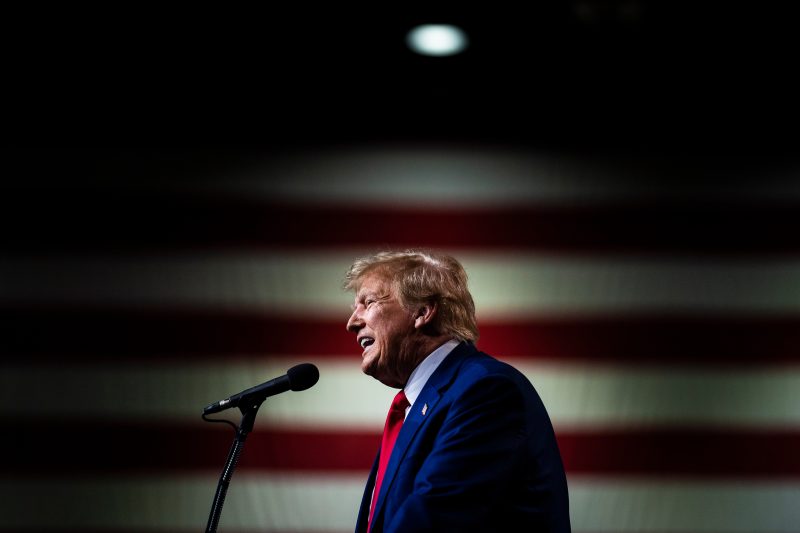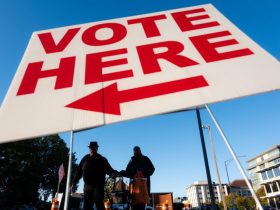With the U.S. Supreme Court declining to intervene early, Donald Trump is now pressing in federal appeals court his claim that sweeping presidential powers protect him from facing prosecution for his efforts to undo the 2020 election results.
In a filing late Saturday night, lawyers for the former president said such immunity is necessary for “bold, fearless Executive leadership” and warned that if Trump is taken to trial it will launch “cycles of recrimination . … that will plague our Nation for many decades to come.”
The U.S. Supreme Court on Friday declined to fast-track consideration of the immunity question, which is crucial to determining whether Trump can be tried for his attempt to block Joe Biden’s victory. That means the standard appeals process will play out, with the U.S. Court of Appeals getting first say on whether former presidents have any protection from criminal prosecution and if so, how much.
The appellate court has signaled that it plans to move quickly, but its decision will almost certainly be challenged in the Supreme Court. Either phase of the appeal could delay a trial scheduled to begin in federal court in Washington, D.C., on March 4, a day before the Super Tuesday primaries.
Trump is again running for president, and leads the Republican field by a wide margin.
The D.C. trial is one of four criminal prosecutions Trump is facing. He is also indicted on federal charges in Florida related to allegedly mishandling classified documents and obstructing government efforts to get them back; he has been charged in state court in Georgia with allegedly trying to block the election results there, and in state court in New York for allegedly falsifying business records related to a hush money payment during the 2016 election campaign.
In the D.C. case, special counsel Jack Smith charged Trump with four counts: conspiring to defraud the United States, conspiring to obstruct an official proceeding, obstructing a congressional proceeding and conspiracy against rights — in this case “the right to vote, and to have one’s vote counted.”
Prosecutors say the constitution makes clear that a president can face criminal prosecution after leaving office.
But Trump’s attorneys argue that their client’s actions — including public statements that falsely claimed widespread fraud in the voting, pressure on Justice Department, state officials and Vice President Mike Pence to declare Trump the winner, and support of efforts to create slates of pro-Trump electors from states won by Biden — constitute “quintessential Presidential acts.”
For any conduct related to his official duties, they say, a president can only be prosecuted if first impeached by Congress. Trump was impeached by the House but acquitted by the Senate.
Judge Tanya S. Chutkan, who is overseeing the D.C. trial, rejected Trump’s reading of the Constitution as going against “plain meaning, original understanding, and common sense.” She added that it would lead to “implausibly perverse” results and be akin to a “divine right of kings.”
In the appellate court, Trump’s attorneys responded to that assertion by emphasizing that they believe a former president can be prosecuted for “purely private” crimes — just not acts related to the office. For those, they argue the president must be impeached first, making it different than “the British monarch’s exceptionless immunity.”
The relevant portion of the Constitution says that impeachment can result only in “removal” and “disqualification” from public office, but that an impeached official “shall nevertheless be liable and subject to” criminal prosecution.
Since the Nixon administration, the Justice Department’s Office of Legal Counsel has taken the view that presidents cannot be prosecuted while in office, because it would make it impossible to perform the duties they were elected to carry out. Trump’s lawyers cite those legal opinions, although the same office that issued them also concluded that a former president could be prosecuted for crimes he was acquitted of by the Senate.
Trump’s filing repeatedly cites a 1998 article by Brett M. Kavanaugh, written when Kavanaugh was involved in the investigation of then-President Bill Clinton. Kavanaugh is now a Supreme Court justice, nominated by Trump in 2018. He cautions in the article against prosecuting a president while in office. But he says the executive could be indicted either after impeachment by the House and conviction in the Senate, or if “he leaves office voluntarily.”
The appeal also relies on a 1982 U.S. Supreme Court ruling that a Pentagon whistleblower could not sue former president Nixon for getting him fired.
“Because of the singular importance of the President’s duties, diversion of his energies by concern with private lawsuits would raise unique risks to the effective functioning of government,” the court declared then. The majority in that case emphasized that they were not considering criminal prosecution, only civil liability. But Trump argues the same distinction between public and private acts should apply in his case, and that he was acting as president when he tried to hold on to power after losing the 2020 election.
A different panel of judges on the D.C. Circuit ruled last month that Trump has no automatic immunity from civil suits brought by police officers and lawmakers who were forced to fight or flee rioters inside the U.S. Capitol on Jan. 6, 2021. That panel, which included a Trump appointee who served in the former president’s White House, agreed unanimously that campaigning to stay in office was not official conduct protected from lawsuits.
Unlike the Supreme Court, the appellate court has agreed to move quickly on the immunity question. The special counsel must respond to Trump’s petition by next Saturday, and then both sides will answer questions from a panel of three judges on Jan. 9.
That panel includes two Biden appointees, Florence Pan and Michelle Childs, and one George H.W. Bush appointee, Karen Henderson.
Chutkan has paused pretrial proceedings until the appeal is decided, but left open the possibility of having the trial start on March 4, as scheduled.
In asking the Supreme Court to bypass the lower appeals court and take up the immunity question quickly, Smith said it was important to ensure that the justices could rule on the matter before their term ends in June.
“The United States recognizes that this is an extraordinary request,” Smith wrote. “This is an extraordinary case.”
Perry Stein contributed to this report.








